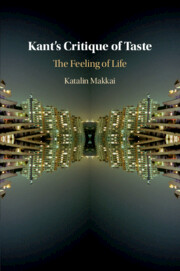Book contents
- Kant’s Critique of Taste
- Kant’s Critique of Taste
- Copyright page
- Contents
- Acknowledgments
- Note on Citations
- Introduction
- Chapter 1 The Art of Judgment
- Chapter 2 Communication and Animation in the Judgment of Taste
- Chapter 3 Subjectivity and Recognition in the Judgment of Taste
- Chapter 4 Modes of Attunement
- Chapter 5 Aesthetic Liking
- Bibliography
- Index
Chapter 3 - Subjectivity and Recognition in the Judgment of Taste
Published online by Cambridge University Press: 07 April 2021
- Kant’s Critique of Taste
- Kant’s Critique of Taste
- Copyright page
- Contents
- Acknowledgments
- Note on Citations
- Introduction
- Chapter 1 The Art of Judgment
- Chapter 2 Communication and Animation in the Judgment of Taste
- Chapter 3 Subjectivity and Recognition in the Judgment of Taste
- Chapter 4 Modes of Attunement
- Chapter 5 Aesthetic Liking
- Bibliography
- Index
Summary
The account developed in Chapter 2 may seem to conflict with Kant’s view that the judgment of taste is a distinctive sort of judgment requiring critical investigation. It has been argued, on the other hand, that Kant’s view is confused: there is no sense of “subjectivity” that sets the judgment of taste apart from other judgments (such as judgments of color) that also lay claim to normativity but present no special problem. This chapter addresses both objections. My reading suggests a requisite sense of “subjectivity.” The judgment of taste is subjective for two related reasons. The first has to do with its essential singularity, which, as I elaborate it, is more radical than the denial of principles or the holism of reasons associated with aesthetic or moral particularism. The second reason is tied to the distinctiveness of the judgment of taste’s claim to normativity. I argue that the judgment of taste represents its object as calling for recognition, where aesthetic recognition should be understood as akin to the acknowledgment of a person. My account yields an explanation of the “autonomy” of taste, according to which one’s judgment of taste must be grounded in one’s own experience of the object.
Keywords
- Type
- Chapter
- Information
- Kant's Critique of TasteThe Feeling of Life, pp. 103 - 136Publisher: Cambridge University PressPrint publication year: 2021

